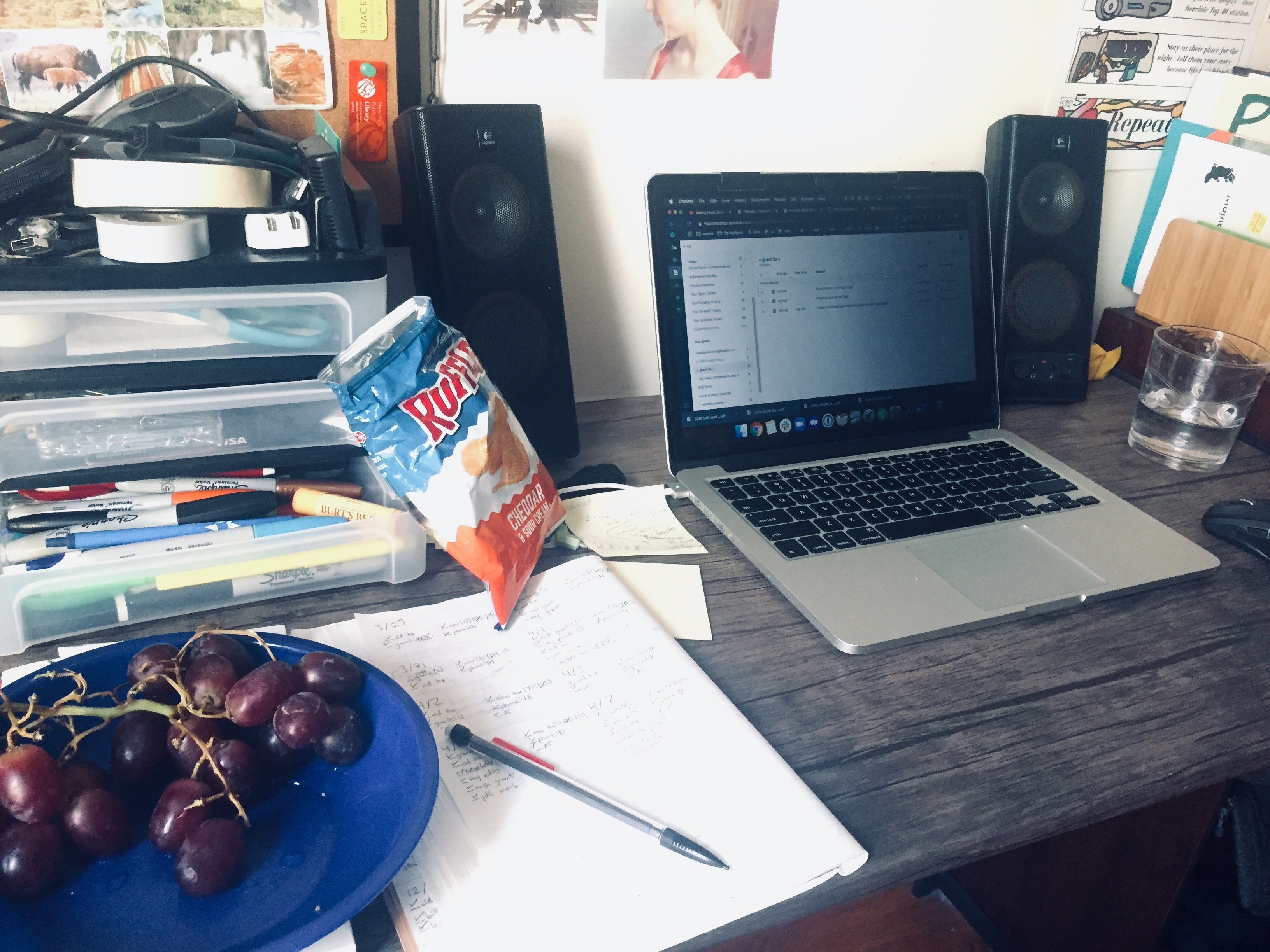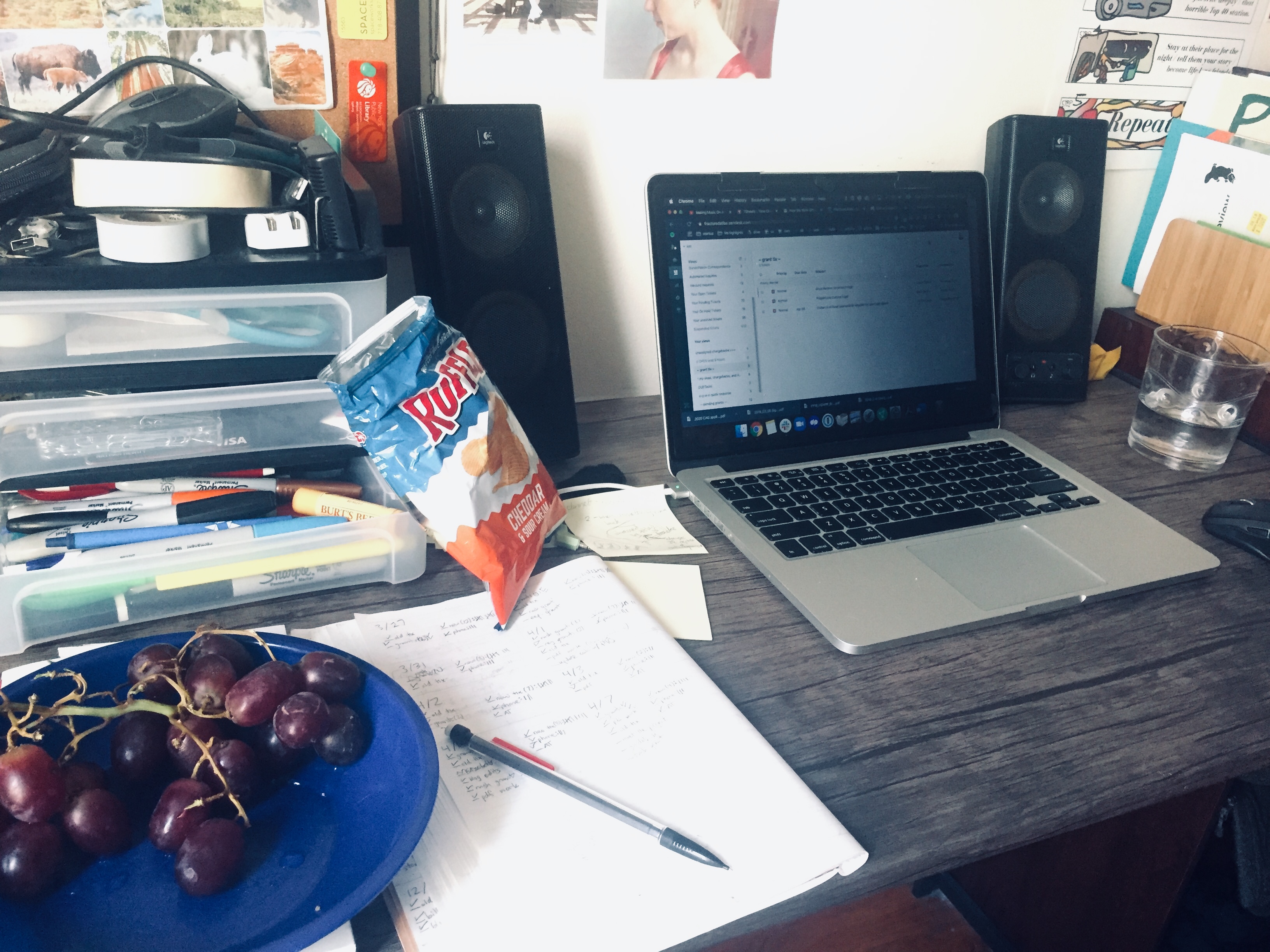How We Work Virtually: Nathan Hewitt
Even in our own team, we’ve seen that people approach virtual working differently. With the freedom to organize our days outside of an office, we’ve each had to find out what kinds of schedules work for us, how to recharge during the day, and how to organize our workspaces. There’s a lot of information out there about how to make working from home work for you, but we know first-hand that there’s no one-size-fits-all approach.
We hope that by sharing tips from individual members of our team, we can encourage you to experiment with different ways to make working from home work for you, and to even find a few tips to try along the way.
Check out how Program Associate Nathan Hewitt organizes his workday from his Manhattan apartment, how long it took him to adjust to remote work, and what tips he’s trying to incorporate from other colleagues’ work habits.

What do you do at Fractured Atlas?
I am a Program Associate, which means that I directly assist our members with their fundraising and event production activities. I’m one of the folks that looks through our projects’ campaigns, reviews grant proposals, and makes sure that our member artists are served as smoothly and efficiently as possible. I love our members!
How do you organize your day?
I use a notebook as my guide. Every day, I list out everything I need to accomplish, starting with anything urgent, then going to important daily tasks, and then expanding to less time-sensitive work and long-term projects. I will usually then organize my day in that order: urgent work, then daily responsibilities, and then projects--checking off completed tasks as I go. Sometimes, however, if I am having trouble making progress on a long-term project like a blog post or working on a guidebook, I will switch things up and use my morning energy to put together a fresh draft.
I follow a consistent routine, starting my day at 9 and ending at 5:30 or 6 depending on the length of my lunch break. The amount of time-sensitive work can vary greatly, so I find it useful to hold myself to that schedule, with time as an (admittedly insufficient) proxy for effort. The routine helps me stay focused on the tasks at hand.
How do you set up boundaries between work/not-work during your day without a commute or an office?
Although I use the same desk for Fractured Atlas work as I do for personal work, there are a few little routines that help to articulate the boundaries between work and not-work.
The first is my work laptop. We’re are fortunate to have separate machines for our work. In the morning, I put away my personal laptop and power up my work laptop, put away my personal notebook and get out my work notebook, and of course I grab a glass of water—stay hydrated, people! At the end of each day, I do the opposite, and after I clock out I also make sure to spend time outside or in another space in the apartment before coming back to my desk.
How do you recharge during the day?
I have to be honest: I’m pretty bad at breaks and snacks. I take breaks, and I eat, but there is absolutely no consistency there. One of the things I do is I keep putting off my break, thinking that I'll do just “one more thing” and then step away from my computer. But there is always something to be done, and sometimes you just need to stop and take care of yourself. I’m also trying to get better about eating a daily breakfast, to start the day off on the right foot. I usually take breaks after I accomplish a particular task, often as a reward. But I recently read about how my colleague Sophia uses the Pomodoro Technique--I might have to give that a try!
How long did it take you to adjust to working virtually? What was challenging and how did you handle it? What was freeing or nice about it?
It took me about four months to adjust to working virtually. I think one of the challenges was embracing the ways that interpersonal communication with my coworkers is different in virtual work. I now feel connected with my colleagues, and we’re always Slack-messaging one another, but at first the lack of serendipitous hallway conversations threw me off. Recently, it has been nice to be able to control my work environment—whether I’m blasting music, opening the windows, or even moving around the apartment to change things up.
How has COVID-19 changed how you work?
We were really fortunate that we were already working from home when the pandemic arrived in the US. My partner also already worked from home, although not to the degree she does now. We just try to communicate with one another about our meeting schedules and talk through where we are planning to work during the day. Sometimes I’ll go sit on the couch when she needs the office, and vice versa.
The other way that COVID-19 has affected my work routine is that I no longer go out to coffee shops to work. A couple months ago, I would have said that getting out of the house and going to other working environments was essential. With the pandemic, I just do my best to simulate that change of scenery within my own home.
What piece of advice would you give to someone who just started working virtually?
I have two pieces of advice:
Give it time! You are not going to get used to this in days--or perhaps even weeks. Take a deep breath, and remember that you are very adaptable.
Listen to your body. Sometimes, in the middle of my work, I will stand up and stretch, or do a little exercise, or grab water and a healthy snack. It is easy to get caught up in the mental work, especially when you are not on the move, and forget to take care of yourself.
Anything else you'd like to add?
Time for me to follow some of my own advice!
Check out how other members of the Fractured Atlas team works in the rest of the How We Work Virtually series!
About Nina Berman
Nina Berman is an arts industry worker and ceramicist based in New York City, currently working as Associate Director, Communications and Content at Fractured Atlas. She holds an MA in English from Loyola University Chicago. At Fractured Atlas, she shares tips and strategies for navigating the art world, interviews artists, and writes about creating a more equitable arts ecosystem. Before joining Fractured Atlas, she covered the book publishing industry for an audience of publishers at NetGalley. When she's not writing, she's making ceramics at Centerpoint Ceramics in Brooklyn.


